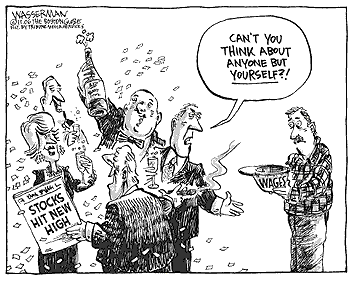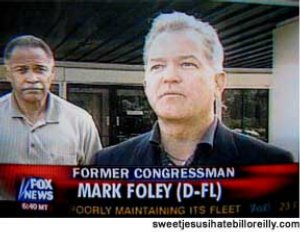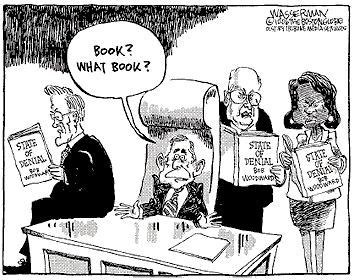From the upcoming Newsweek.
Cheney still doesn't get it on Iraq.
A surreal facet of the Iraq fiasco is the lag between when a fact becomes obvious and when the fiasco's architects acknowledge it
By George F. Will
Newsweek
Nov. 6, 2006 issue - Many months ago it became obvious to all but the most ideologically blinkered that America is losing the war launched to deal with a chimeric problem (an arsenal of WMD) and to achieve a delusory goal (a democracy that would inspire emulation, transforming the region). Last week the president retired his mantra "stay the course" because it does not do justice to the nimbleness and subtlety of U.S. tactics for winning the war.
A surreal and ultimately disgusting facet of the Iraq fiasco is the lag between when a fact becomes obvious and when the fiasco's architects acknowledge that fact. Iraq's civil war has been raging for more than a year; so has the Washington debate about whether it is what it is.In a recent interview with Vice President Cheney, Time magazine asked, "If you had to take back any one thing you'd said about Iraq, what would it be?" Selecting from what one hopes is a very long list, Cheney replied: "I thought that the elections that we went through in '05 would have had a bigger impact on the level of violence than they have ... I thought we were over the hump in terms of violence. I think that was premature."
He thinks so? Clearly, and weirdly, he implies that the elections had some positive impact on the level of violence. Worse, in the full transcript of the interview posted online he said the big impact he expected from the elections "hasn't happened yet." "Yet"? Doggedness can be admirable, but this is clinical.
Anyway, what Cheney actually said 17 months ago was that the insurgency was in its "last throes." That was much stronger than saying we were "over the hump" regarding violence. Beware of people who misquote themselves while purporting to display candor.
The latest plan to pacify Baghdad—announced in June, declared a failure in October—was called Operation Together Forward. But U.S.-Iraqi togetherness is a sometime thing. Last April, The Washington Post's Jonathan Finer reported from Hawijah, Iraq, on a joint patrol to search for roadside bombs. The Iraqis refused to ride in armored U.S. Humvees, preferring pickup trucks because a cleric told them that anyone killed in an "occupier vehicle" would not go to heaven. Eventually, after threatening them with jail, U.S. Army Lt. Aaron Tapalman browbeat them into Humvees:
"About an hour later, the patrol came across a white bag on the roadside that Tapalman suspected might contain a bomb. When he asked some Iraqi soldiers to move it off the road, their commander balked, saying it wasn't his job. 'It is your job to protect the people,' Tapalman said, increasingly exasperated. 'I can go and move it myself, and you know what? I will, but don't you think your people should see you doing that kind of stuff? Someday we're not going to be here anymore.' The Iraqi soldier declined again, apologetically, and drove away."
A mordant joke told during the Cold War concerned asking an Italian, a Frenchman, an Englishman and a Russian to each describe his most cherished dream. The Italian said, "I want my country to produce the greatest artists." The Frenchman said, "I want my nation to produce the greatest philosophers." The Englishman said, "I want my country to produce the greatest parliamentarians." The Russian said, "I want my neighbor's cow to die."
The joke was no laughing matter because it turned on this truth: A history of brutalizing tyranny had stunted the Russians' aptitude for collective aspirations. Which brings us back to Iraq, which Patrick J. McDonnell of the Los Angeles Times covered for two years following the 2003 invasion. He recently returned. His Oct. 23 report ( "Into the Abyss of Baghdad") begins:
"I keep seeing his face. He appears to be in his mid-20s, bespectacled, slightly bearded, and somehow his smile conveys a sense of prosperity to come. Perhaps he is set to marry, or enroll in graduate school, or launch a business—all these flights of ambition seem possible. In the next few images he is encased in plastic: His face is frozen in a ghoulish grimace. Blackened lesions blemish his neck. 'Drill holes,' says Col. Khaled Rasheed, an Iraqi commander who is showing me the set of photographs."
Electric drills are the death squads' preferred instruments of torture. McDonnell:
"One evening I accompanied a three-Humvee convoy of MPs through largely Shiite east Baghdad ... The objective that evening was to patrol with Iraqi police, but the Iraqi lawmen are hesitant to be seen with Americans, whom they regard as IED [improvised explosive device] magnets. The joint patrol never worked out ... The next night, an armor-piercing bomb hit the same squad, Gator 1-2. A sergeant with whom I had ridden the previous evening lost a leg; the gunner and driver suffered severe shrapnel wounds."
For what?










